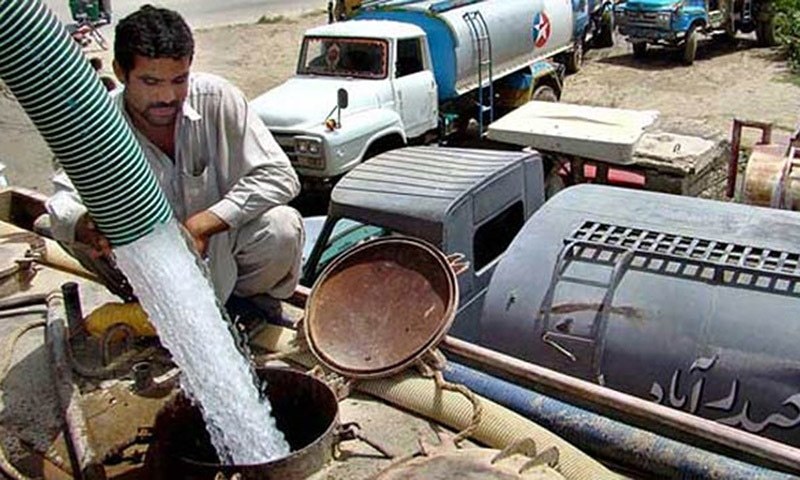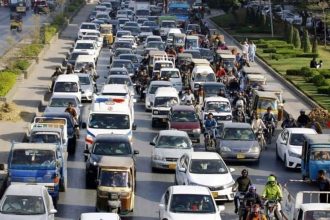The residents of Clifton, Defence Housing Authority (DHA), Mehmoodabad, Jamshed Town, Lyari, Keamari and their adjoining areas, including Gulshan-Faisal and Bath Island, will be faced with an acute water shortage. The pipeline that burst on Saturday has caused a shortfall of 70 million gallons per day (MGD) of water in the city.
Karachi has a total water supply of 550 MGD. University Road, one of the city’s main thoroughfares, was inundated on Saturday evening when a water supply line measuring 84 inches in diameter burst near the Federal Urdu University of Arts, Science and Technology.
The situation became worse when a valve was damaged by a Karachi Metropolitan Corporation (KMC) dumper that hit it while clearing the passage for the water stream from the burst pipeline. As a consequence, the road witnessed a severe traffic jam.
The valve was repaired on Sunday evening, and the road will be cleared of water in a few hours, according to KWSB officials.
Meanwhile, the water from the pipeline is going to take another 36 to 48 hours to recede. “Water will take 36 to 48 hours to recede from the pipeline that burst behind the Aziz Bhatti Park on main University Road,” said Karachi Water and Sewerage Board (KW&SB) bulk water supply chief engineer Sikander Ali Zardari. “The repairs will take another 24 hours [after the water has receded] to make the pipeline functional.”
According to Zardari, one of the three Greater Karachi Lines (GKL) burst at 5pm, carrying 50 MGD of water to the Central Ordinance Depot (COD) for filtration and further distribution to the different areas of Karachi. The other two lines also carry 50 MGD each. The areas affected by the suspension of the burst line are Clifton, DHA, Mehmoodabad, Jamshed Town, Lyari, Keamari and their adjacent areas.
“The pipeline was 84 inches in diameter and was carrying 50 MGD of water,” said Zardari. “But the shortfall is up to 70 MGD because we have decreased the flow in the other two pipelines [as well].”
According to Zardari, who has been stationed at the site since the incident, the recession of water is the major issue they are currently facing. “We cannot start the repair work until the water recedes from the pipeline and we have installed five submersible pumps on site for the purpose,” he said. “The water coming out is also being drained in the nearby nullah.”
Zardari said that work was in progress on the pipeline after they received complaints of water leakage when it burst. According to him, the pipeline was installed in 1958 as part of the GKL project, from Keenjhar Lake to COD in Karachi. The pre-stress concrete (PSC) pipeline starts from Samama, opposite Safari Park on main University Road and goes on to COD. The pumps have been closed at Dhabeji pumping station, he said, adding that the gate has also been closed near Samama to stop the water flow in the damaged line.
Zardari further said that the situation is under control and all necessary measures have been taken to repair the damaged pipeline.






